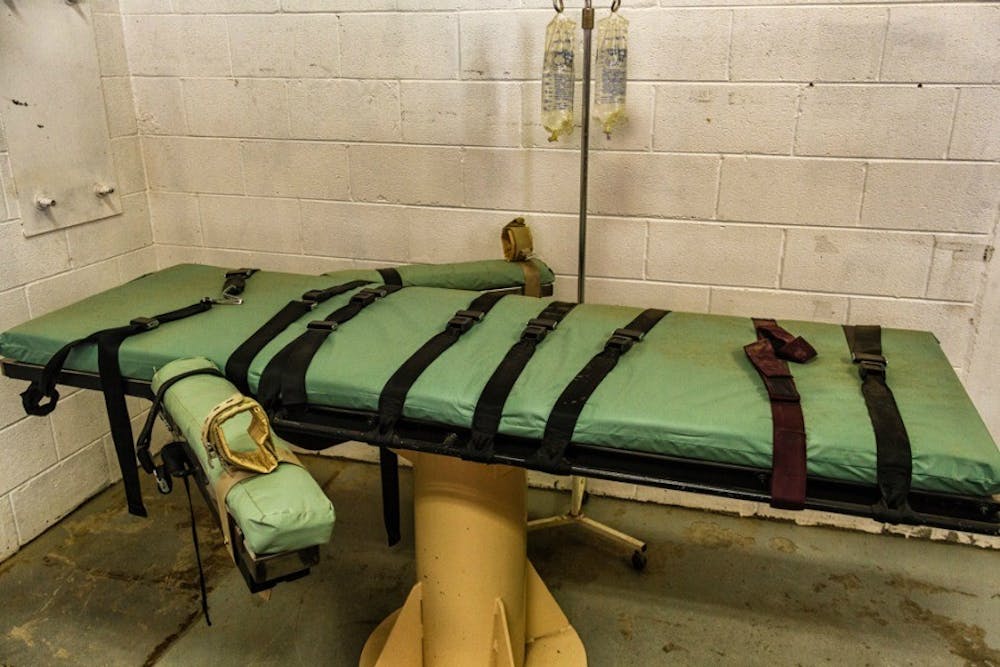By Jamie Pitera, For The Miami Student
Many people believe that only guilty criminals get the death sentence. However, this is not true at all.
According to Michael McLaughlin's Huffington Post article "Shocking Number of Innocent People Sentenced To Death, Study Finds," more than four percent of death row inmates are actually innocent. This points to a huge flaw in our court systems.
On top of this, most death row inmates are convicted without any incriminating DNA evidence.
If the United States courts put innocent people on death row with no DNA evidence, then why do we bother with "innocent until proven guilty?"
From 1989 to 2012, The United States court system wrongly convicted over 2,000 death row inmates. What most supporters of the death penalty do not realize is that every execution costs approximately two to three million dollars to be processed and carried out. If you multiply two million dollars by the 2,000 inmates wrongly convicted and sentenced to death row, you would find an extra four billion dollars that our country has wasted by murdering our own innocent people over the course of only 23 years. This is money our country cannot afford to waste.
Recent studies have shown that most of the people on death row are male, black, poor and younger than the average citizen. For example, from 1976 to 2012, 20 white men were sentenced to death for the murder of African Americans. If you compare that to the 253 African Americans sentenced to death for the murder of white victims, you will notice that black Americans are judged and punished much more severely than white criminals for similar crimes. These racial differences imply that white lives are more important than black lives and that white deaths are taken more seriously.
If the government is persuaded by racism, how can we expect racism to end in our everyday society? For example, let's take a look at the case of Mahmood Mattan, a black man convicted for the murder of Lily Volpert, a local storeowner.
One day, Lily was sitting outside the back door of her shop when she noticed a "colored man" looking around inside. She went inside to help him and he continued on his way. Later in the day, an older woman entered the store and reported a "colored man" lingering outside of the shop. When the next customer entered Lily's shop, Lily was lying on the floor with her throat cut and over $100 stolen out of her drawer.
Three hours later, Mattan was arrested. Although there were no eyewitnesses, the prosecution accused Mattan of lying, their logic being that the only reason he would have to lie would be to cover "murderous activities."
Of the 41 witnesses who testified against Mr. Mattan, only two of them had evidence. He was found guilty and sentenced to death. Forty-six years after his execution, evidence was found that Mahmood Mattan was innocent and the court sent their apologies to his family. Mattan was executed due to the stereotype associated with the color of his skin.
Now let's take a look at how the execution of innocent people affects both the victims and the executed victim's families. Although the death penalty is meant to punish the criminal and give justice to the victim, the family members of both the criminal and the victim are often punished as well. For example, family members of the victim report that instead of giving them closure, the long appeals process of the death penalty prolongs their suffering. Both the family of the executed and the family of the victim often experience symptoms such as depression, grief, post-traumatic stress disorder and even suicide. Children of the innocently executed may have difficulty with healthy relationships, social situations and truancy.
The execution of the innocent is a major problem in the United States today. However, this is a problem that has a solution. I strongly believe that we should abolish the death penalty. Instead of execution, murderous prisoners should receive a sentence without a deadline. Not only does wrongful execution cause the United States to spend millions of dollars, but it also divides us among ourselves, separating us into whites and blacks. We need to stand together to make a change.

